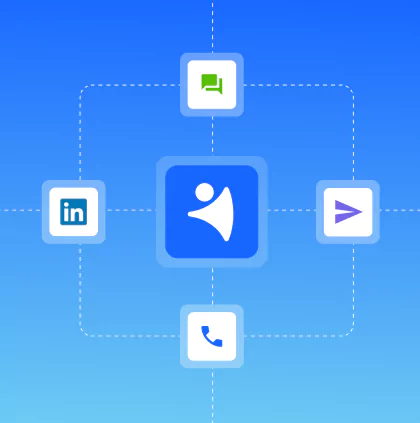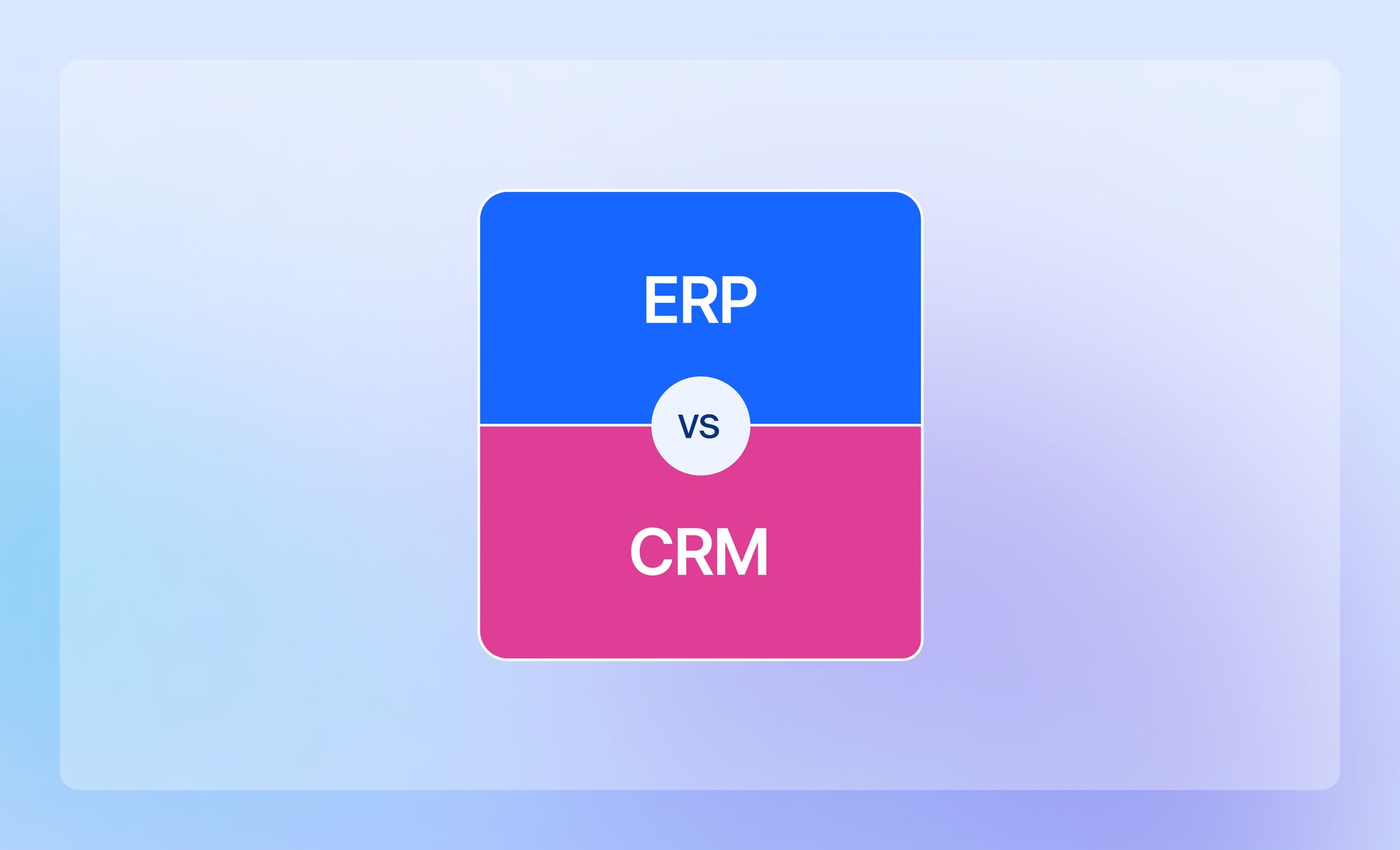Does your business need CRM or ERP? Let’s find out.
It’s easy to get lost in the alphabet soup of tech acronyms. However, using the technology behind them makes the difference between unicorns and failures. So, which one do you choose? Should you use ERP to optimize your daily operations? Or should you opt for a CRM like NetHunt to get more leads and make your customers happy? You’ll find your answer by the end of this post.
What are ERP systems vs CRM?
Let’s start by defining enterprise resource planning and customer relationship management.
What is ERP?
ERP stands for enterprise resource planning.
This type of business software helps with daily internal operations. ERP is usually a complex suite of individual but interconnected modules that deal with finances, inventory, supply chain management, human resources, and other processes.
ERP improves internal or back-office business processes. But it can indirectly affect customer-facing operations, too. For example, better warehouse and inventory management can mean faster shipping and improved customer satisfaction.
What is CRM?
CRM stands for customer relationship management.
It’s business software that helps companies interact with customers and improve sales. CRM is designed for sales, marketing, and customer support teams.
CRM boosts external or front-office business operations and has less influence on internal business management. Yet, through increased sales and customer lifetime value, CRM can directly affect the company’s bottom line. NetHunt CRM is a fine example of a powerful CRM tool for business.
CRM vs ERP: What can they do for you?
ERP and CRM are not the same, but both use databases to capture, store, and organize your data. Moreover, both use that data to generate analytics and reports to help businesses with their decision-making. Of course, the datasets are different, and they are used for different goals, but it was worth mentioning before we jump into the ERP and CRM systems feature sets.
Core ERP features include:
- Financial management. ERPs usually have modules for accounting, invoicing, budgeting, payroll management, and other financial operations.
- Supply chain management. With an ERP, you can optimize stock procurement, shipping, and storage. Timely deliveries and shipping are also made easy.
- Inventory management. ERP holds stock data to prevent stockouts, ensure timely reorders, and optimize warehousing and picking processes.
Critical CRM features are:
- Lead management. CRMs generate and nurture leads, pushing them through the sales pipeline stages toward conversion. With a CRM, you get all lead details in one place, conveniently organized for every team member’s use.
- Sales tracking. A CRM gives you a bird' s-eye view of all deals across different pipeline stages. Clear visualization helps you identify bottlenecks and adjust your sales strategy.
- Customer service. With a CRM, your customers enjoy a seamless omnichannel experience via email, phone, or messenger. Storing all relevant information helps improve customer service and boost their satisfaction.
- Marketing automation. CRM takes over routine tasks and ensures your marketing campaigns go through without a hitch. This improves lead nurturing efforts and generates additional sales.
- Reporting. CRMs automate and speed up report generation. Thanks to instant (and customizable) insights, you can monitor team performance, boost lagging deals, and adjust your sales strategy.
So you see, ERP & CRM features may not be the opposite, but they address different business needs. Your sales and marketing team will love working with a CRM, but manufacturing and warehouse employees won’t say no to an ERP.
CRM and ERP: When do you need them?
Businesses want to make more money. Both ERP and easy CRM tools can help with that, but they’ll get you there in different ways. Where ERP is the stick designed to cut unnecessary expenses and optimize your employee’s every action, CRM is the carrot aimed at customers to lure them into your sales team’s embrace.
Let’s look at the difference between ERP and CRM to help you decide which would suit your business best.
Aspect
ERP
CRM
Process
Back-office; internal
Front-office; customer-centric
Objectives
Minimize cost and optimize efficiency and productivity
Maximize sales and improve customer satisfaction
Core function
Supply chain and finance management
Customer relationship management; deals tracking via pipeline; lead nurturing; reporting
Users
Accounting; human resources; warehousing; manufacturing
Sales managers; marketers; customer service
Data
Stock, inventory, delivery, HR, accounting, etc.
Lead details, communication history, interactions, etc.
Interchangeability
Can fulfill limited CRM functions
Can fulfill ERP functions via customization
Integrations
CRM and other business software
ERP and other business software
Business size
Large enterprises
Startups, SMBs
Budget
Expensive custom plans
Flexible pay-as-you-go plans
As you can see, ERP/CRM is not the case of either/or. Rather, they are different sides of the same coin, both working towards boosting your profit.
CRM and ERP: How can they benefit your business?
Many of the benefits of CRM and ERP align. Just check out the CRM and ERP differences:
Benefit
ERP
CRM
Increase productivity
Automated tracking of materials, products, and resources optimizes all business processes.
Routine task automation frees up managers’ time for direct customer interactions and tasks that can’t be automated.
Improve collaboration
Sharing employee and asset records across HR and finance teams helps reduce errors and align everyone’s efforts with your goals.
Access to lead data across marketing, sales, and customer service teams helps develop a cohesive approach to lead generation and nurturing.
Reduce costs
Eliminating manual tasks, like data entry, by using a single system for all business processes reduces paycheck expenses.
Automated data entry, manager assignments, and other tasks free up hours every week, reducing workload and required team size.
Generate insights
Automated reports reduce human error and accelerate decision-making
Automatically generated reports provide insights about customer needs, missed opportunities, and the marketing campaign quality.
Boost profits
Understanding customer needs and having full information on stock helps predict and address demand
Improved customer experience enhances brand image and boosts brand loyalty, promoting upsells and cross-sells.
CRM and ERP systems provide these benefits in different ways, and how noticeable they are depends on your business size and industry. For example, small customer-centric businesses may not need an ERP but can make the most of CRM functionality. In contrast, multinational enterprises may not care as much about customer satisfaction but need ERP to handle internal processes.
Can you use ERP and CRM simultaneously?
Yes, you can use ERP and CRM software together. In fact, you definitely should.
Their combined effect can simultaneously reduce your expenses and increase sales. So you double the positive impact with minimum effort. The trick is to choose compatible software solutions.
For example, NetHunt CRM does not have direct integrations with ERP systems. But you can configure them using Zapier. So, if you’re already using an ERP, just check its Zapier integrations and connect it to your NetHunt CRM for an optimized experience.
Why should sales and marketing teams choose CRM over ERP?
Suppose you run a small sales and marketing team focusing on top customer satisfaction. NetHunt CRM will serve you better than any ERP, and here’s why:
NetHunt CRM unlocks lead generation and nurturing
- If most of your business runs through the inbox, NetHunt will be especially handy. It’s a Gmail-integrated CRM with a full-scale CRM toolset right in your inbox sidebar.
- You’ll have detailed and perfectly organized records with all necessary lead and customer data at your fingertips.
- You can segment them for targeted drip campaigns and move leads through the sales pipelines toward successful conversion.
Get full control of your sales pipelines with NetHunt CRM
With our customization and sales automation, you can set up as many unique pipelines as you need to track the sales progress by deal, manager, product, region, expected profit or any other parameter.
You’ll find default settings in NetHunt pipeline management CRM, but you can adjust them and create new ones from scratch. For example, you can zoom in on the lead nurturing process with a dedicated marketing pipeline. Meanwhile, a post-sale pipeline will help you increase customers’ lifetime value through repeat sales, referrals, etc.
NetHunt CRM automates routine tasks, saving you time and money
With NetHunt CRM, you can automate most manual lead management and nurturing tasks, like data entry, interaction records, follow-ups, pipeline update, tasks assignment and more. Thanks to an intuitive interface, you can build complex automated email campaigns and workflows in minutes with minimal technical skills.
NetHunt is especially useful for sales and marketing team managers. Once a new deal appears in the system, NetHunt automatically assigns a manager and sets up tasks. Depending on your processes, this could include tasks like lead qualification, call scheduling, and more. You can also customize notifications to stay updated whenever something important happens with a deal or lead..
Conclusion
So, ERP or CRM? ERP helps businesses run smoothly and keep expenses down. CRM helps companies improve customer satisfaction and sales. One is best for internal optimization for large enterprises. The other works wonders for SMBs looking to build up their brands and gain customer recognition. CRM/ERP toolsets reflect these different approaches to making more money. ERP focuses on resources, finance, and HR management, while lead management and nurturing are the prime CRM objectives.
You don’t have to choose one or the other. CRM and ERP software work well together, especially when integrated into a single system. But if you can’t afford to invest in both right now, NetHunt CRM is an excellent choice, especially if your business focuses on customer relationships and sales.
FAQs
What is the difference between CRM and ERP?
CRM is a customer-facing business solution that raises sales through improved customer satisfaction. Meanwhile, ERP is an internal business solution that improves productivity and reduces costs through centralized resource management. Both can cut costs and increase profits, but they achieve these goals using different tools (i.e., lead nurturing for CRM and inventory management for ERP).
Can CRM be integrated with ERP?
If you use NetHunt CRM, you can configure ERP integrations through Zapier. You can check the full list of integrations available via Zapier to ensure your ERP can be integrated with NetHunt CRM.




















 product experts — let's find the best setup for your team
product experts — let's find the best setup for your team